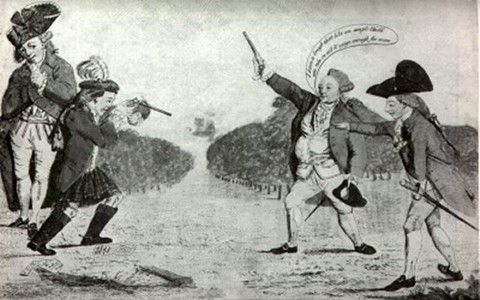
It doesn’t take much imagination to mock Kentucky’s oath of office, which contains this gloriously anachronistic bit of verbiage:
I do further solemnly swear (or affirm) that since the adoption of the present Constitution, I, being a citizen of this State, have not fought a duel with deadly weapons within this State nor out of it, nor have I sent or accepted a challenge to fight a duel with deadly weapons, nor have I acted as second in carrying a challenge, nor aided or assisted any person thus offending.
Funny stuff in 2010, given that contemporary gentlemen so rarely settle their differences by resorting to pistols at dawn. But Kentucky’s outdated oath provides a salient reminder of the threat that dueling once posed to national security. As outlined in a recent issue of The Journal of the Early Republic (paywalled, alas), duels between antebellum military officers deprived America’s armed forces of many of its most talented leaders:
Even though most duels were not fatal, dueling was so prevalent in the decades after Hamilton’s death that scores of men fell by pistol and sword on fields of honor across America. Despite an 1806 law barring challenges between officers, dueling had become so rampant in the Army and Navy that the historian William Stevens once calculated that “two thirds as many officers were killed by dueling as were slain in all the naval battles between 1798 and the Civil War.”
The anti-dueling movement that picked up steam in the 1820s and ’30s helped salvage the officer corps’ integrity, primarily by promoting a public-service message that was the “This Is Your Brain on Drugs” of the day: Dueling equals suicide. By writing and sermonizing about duelists who were self-destructive louts rather than noble soldiers, early 19th-century preachers slowly convinced the masses that shootouts were just gussied-up forms of self-murder:
The itinerant Pennsylvanian book-peddler and moralist Parson Weems imagined a link between
dueling and intentional suicide. Describing young men overtaken by ‘”gambling, goatish lust, or satanic pride,” Weems speculated that the desperate urge to escape their mounting troubles through death was probably very great. “And if they can’t muster patience, to wait long enough to kill themselves with whiskey and tobacco,” he remarked, “they will give way to their brutish passions and provoke some other madman to blow out their brains.”
It was sort of a genius rhetorical strategy, and one that makes the modern era’s more lackluster public-service campaigns seem inelegant in comparison. Parson Weems would certainly have chortled at “Just Say No”‘s lack of cleverness.


Brian Moore // Aug 20, 2010 at 3:31 pm
I am definitely against dueling by our soldiers or sailors — they’re valuable and useful, and we wouldn’t want them hurt or killed.
But Hamilton v. Burr style politician shoot outs? I’m all for those! Also, reality tv show stars.
Brendan I. Koerner // Aug 20, 2010 at 5:01 pm
Better yet, reality TV stars versus politicians. Imagine the possibilities–Snooki and Tom Coburn, pistols at dawn…
Brian Moore // Aug 21, 2010 at 11:18 am
Perfect!
monkeyball // Aug 23, 2010 at 8:26 pm
Um, guys? You do realize that either scheme would pretty much end up with Sarah Palin being the last politician (and reality-tv star) left standing, right?
Casketville // Sep 9, 2010 at 12:34 pm
[…] It’s also worth noting that of the 15 American cities with homicide rates above 20 per 100,000 in 1927, 11 were located in the South. (The non-Southern murder capitals were Kansas City, Detroit, Sacramento, and—believe it or not—Pueblo, Colorado.) Was this because of economic underdevelopment, which in turn deprived law enforcement of vital resources? Or was there a sociological explanation, perhaps having to do with uniquely Southern notions of honor and revenge? Remember, the South was also where the vast majority of lethal duels occurred during the first half of the 19th century, until religious leaders started equating dueling with suicide. […]